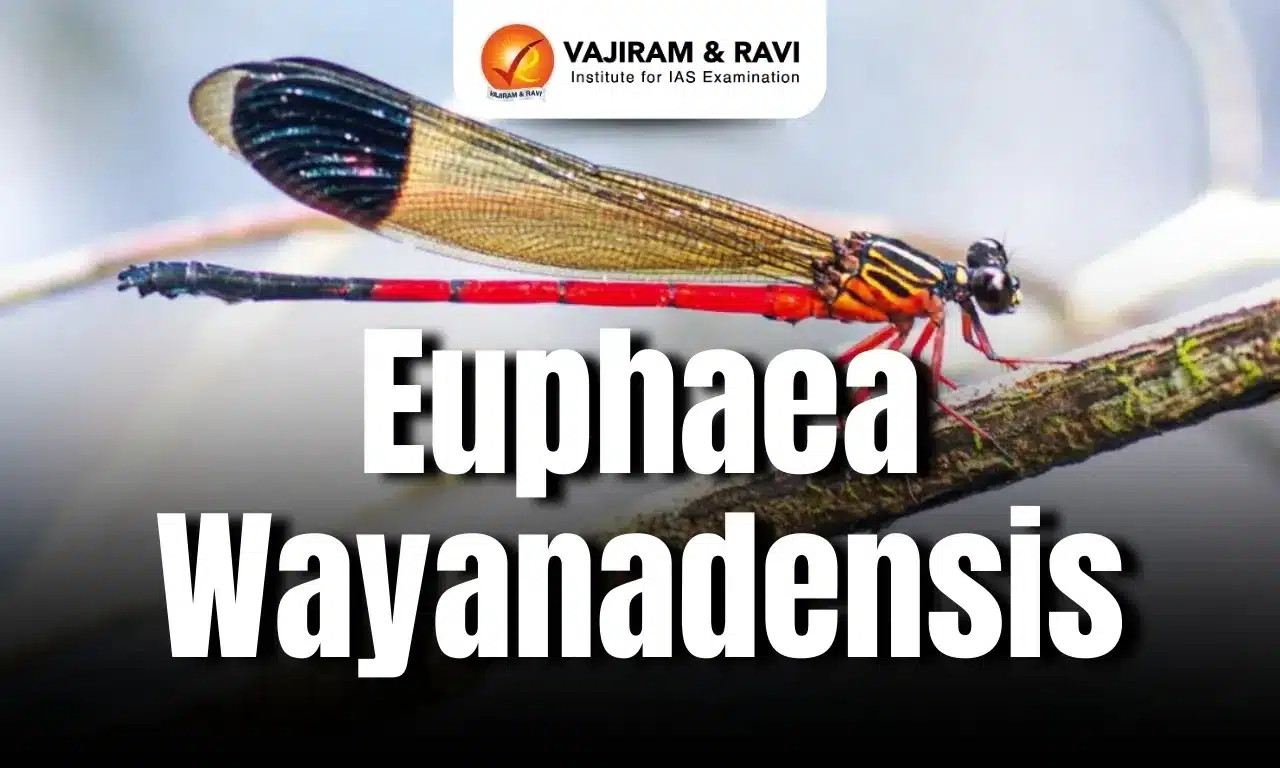Euphaea Wayanadensis Latest News
A new species of damselfly, Euphaea wayanadensis, has been discovered in the Wayanad region of the Western Ghats, Kerala.
- This discovery adds to Kerala’s 191st recorded odonate species and the 223rd odonate species documented from the Western Ghats. The findings were published in the peer-reviewed journal ENTOMON.
About Euphaea wayanadensis
- Classification: Belongs to the family Euphaeidae.
- First sightings: Initially observed in 2013 at the Kalindi River, Thirunelli, in Wayanad district, Kerala.
- Further sightings occurred from 2013 to 2019 in Wayanad, followed by more observations from 2019 to 2023 in Aralam (Kannur, Kerala) and the western slopes of Coorg (Karnataka).
- Identification challenges:
- Initially misidentified as Euphaea pseudodispar, a species from Maharashtra.
- Later confirmed as a distinct species through detailed morphological study and genetic analysis.
Key Morphological Features
- Distinctive hind wing: Features a longer black patch compared to related species.
- Striking colouration: Males display broader and uninterrupted humeral and antehumeral stripes.
- Unique genital structure: The male genital vesicle exhibits structural traits that differ from closely related species.
Habitat and Distribution
- Prefers fast-flowing streams with rocky beds and aquatic vegetation.
- Thrives in evergreen and semi-evergreen forest regions along stream banks.
- Active throughout the year, except in the dry seasons of March and April.
- Shows highly restricted distribution, making it vulnerable to habitat loss and climate change.
Euphaea Wayanadensis FAQs
Q1. What is Euphaea wayanadensis?
Ans. It is a species of damselfly endemic to the Western Ghats, particularly found in Kerala.
Q2. Why is Euphaea wayanadensis important for ecology?
Ans. It acts as an indicator of freshwater ecosystem health since damselflies are sensitive to water pollution.
Q3. Where was Euphaea wayanadensis first discovered?
Ans. It was first described in Wayanad, Kerala, hence the name “wayanadensis.”
Source: TH
Last updated on February, 2026
→ UPSC Notification 2026 is now out on the official website at upsconline.nic.in.
→ UPSC IFoS Notification 2026 is now out on the official website at upsconline.nic.in.
→ UPSC Calendar 2026 has been released.
→ UPSC Final Result 2025 is expected to be released in the second week of April 2026.
→ Check out the latest UPSC Syllabus 2026 here.
→ Join Vajiram & Ravi’s Interview Guidance Programme for expert help to crack your final UPSC stage.
→ UPSC Mains Result 2025 is now out.
→ UPSC Prelims 2026 will be conducted on 24th May, 2026 & UPSC Mains 2026 will be conducted on 21st August 2026.
→ The UPSC Selection Process is of 3 stages-Prelims, Mains and Interview.
→ Prepare effectively with Vajiram & Ravi’s UPSC Prelims Test Series 2026 featuring full-length mock tests, detailed solutions, and performance analysis.
→ Enroll in Vajiram & Ravi’s UPSC Mains Test Series 2026 for structured answer writing practice, expert evaluation, and exam-oriented feedback.
→ Join Vajiram & Ravi’s Best UPSC Mentorship Program for personalized guidance, strategy planning, and one-to-one support from experienced mentors.
→ Check UPSC Marksheet 2024 Here.
→ UPSC Toppers List 2024 is released now. Shakti Dubey is UPSC AIR 1 2024 Topper.
→ Also check Best UPSC Coaching in India




















